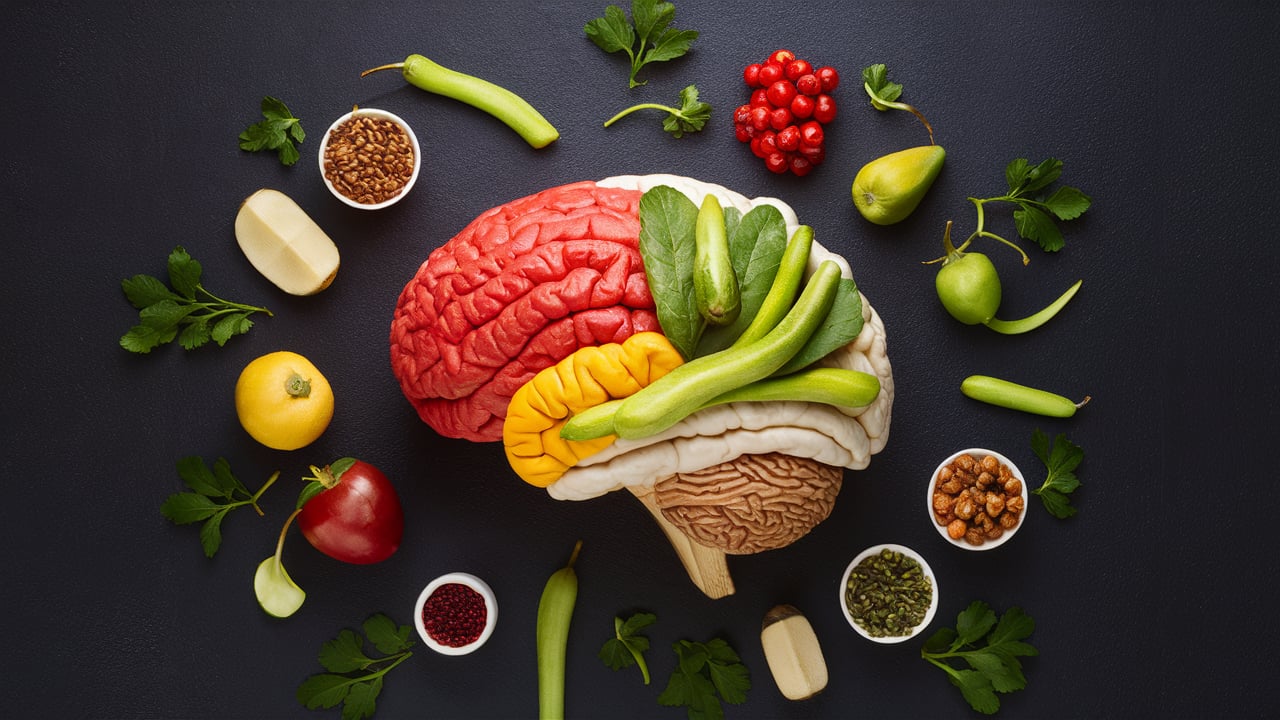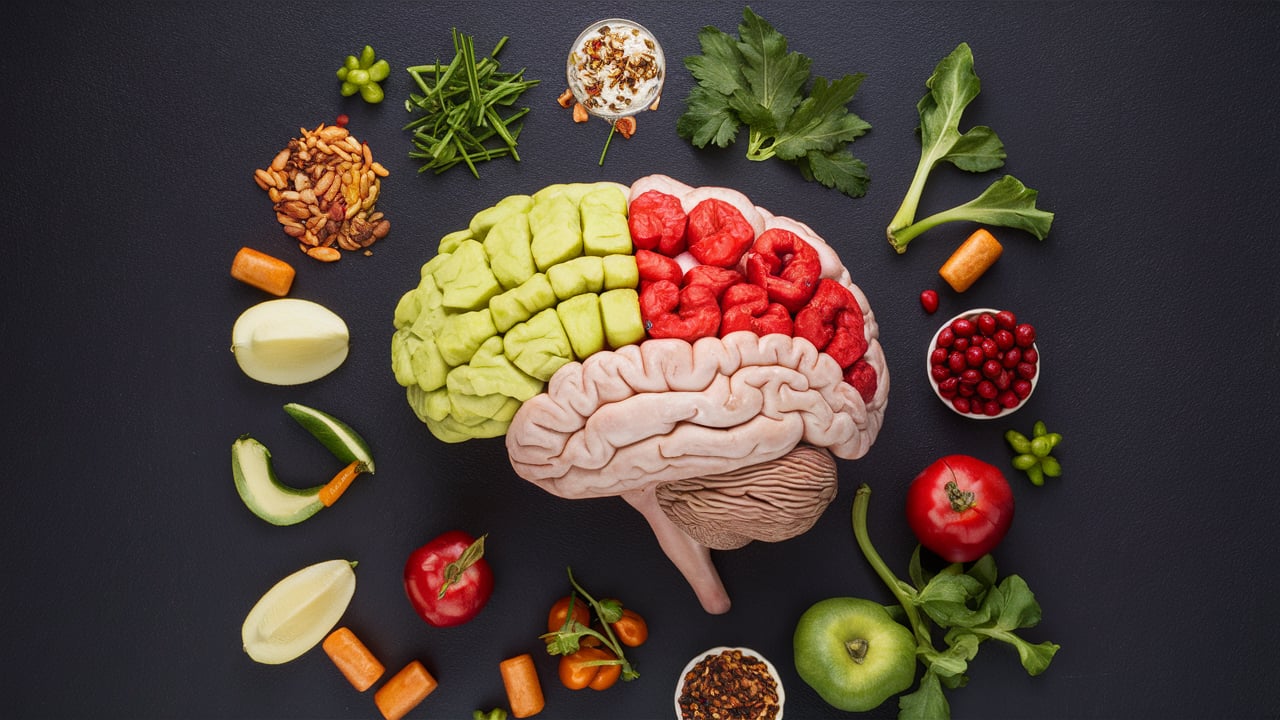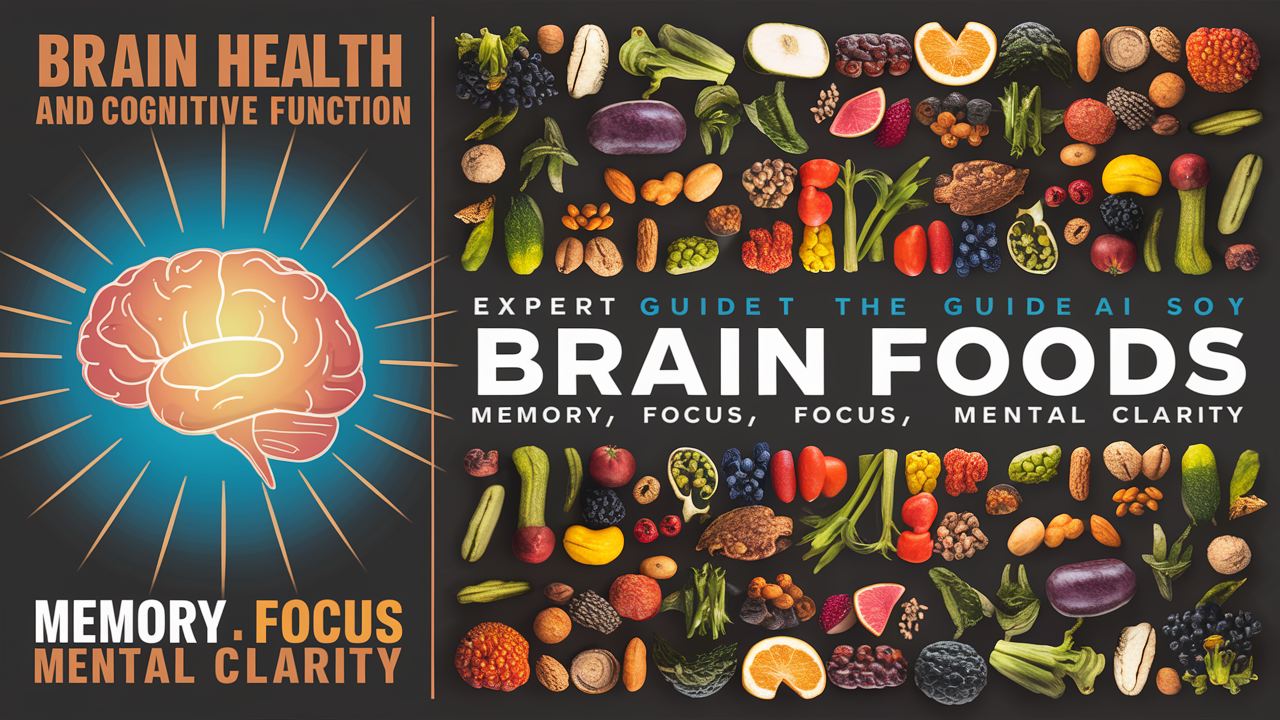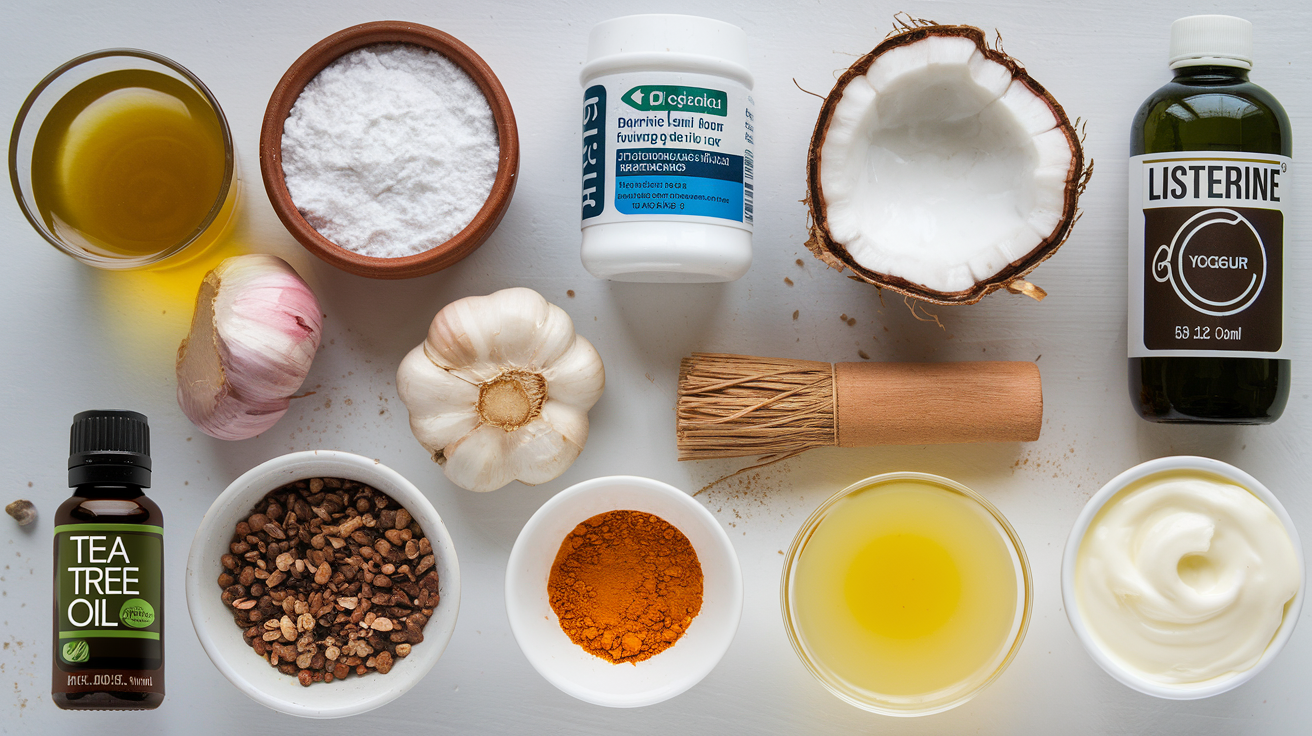The Impact of Nutrition on Brain Health
In our fast-paced world, maintaining optimal brain health is more important than ever. Our diet plays a crucial role in cognitive function, influencing everything from memory to mood. As we age, it becomes increasingly important to focus on the nutrients that can support brain health and prevent cognitive decline. This comprehensive guide delves into the best brain foods and how their nutrients affect brain function.
Understanding the relationship between diet and brain health is essential for everyone, from students to seniors. Cognitive function encompasses various mental processes, including memory, attention, language, problem-solving, and decision-making. The brain requires a constant supply of energy and nutrients to perform these functions effectively. Hence, what we eat directly impacts our brain’s ability to function optimally.
This blog post will explore the key nutrients necessary for brain health, highlight top brain-boosting foods, and answer common questions related to diet and cognitive function. By the end of this guide, you’ll have a deeper understanding of how to nourish your brain for improved mental clarity, memory, and overall cognitive well-being.
Key Nutrients for Brain Health
- Omega-3 Fatty Acids
Omega-3 fatty acids are essential fats that the body cannot produce on its own, making it crucial to obtain them from the diet. These fats are integral to brain health, playing a key role in building cell membranes, reducing inflammation, and promoting communication between brain cells. The two most important types of omega-3s for brain function are eicosapentaenoic acid (EPA) and docosahexaenoic acid (DHA), primarily found in fatty fish.
Numerous studies have shown that omega-3s can significantly impact brain health. For instance, they are known to enhance cognitive performance and are linked to a lower risk of Alzheimer’s disease and other forms of dementia. Omega-3s also play a role in mood regulation, with research indicating their potential in alleviating symptoms of depression and anxiety.
Incorporating omega-3-rich foods into your diet is straightforward. Fatty fish like salmon, mackerel, sardines, and trout are excellent sources. For those following a plant-based diet, flaxseeds, chia seeds, and walnuts are rich in alpha-linolenic acid (ALA), which the body can partially convert to EPA and DHA. Including a variety of these foods in your weekly diet can help ensure you receive an adequate intake of omega-3s to support your brain health.
- Antioxidants
Antioxidants are compounds that protect your cells from damage caused by free radicals, unstable molecules that can cause oxidative stress and contribute to aging and diseases, including neurodegenerative disorders. The brain is particularly vulnerable to oxidative stress due to its high oxygen consumption and lipid-rich environment, which makes antioxidant intake crucial for maintaining cognitive function.
Vitamins C and E are well-known antioxidants that play a protective role in the brain. Vitamin C, found in high concentrations in the brain, is involved in neurotransmitter synthesis and neural protection. Foods rich in vitamin C include citrus fruits, bell peppers, strawberries, and broccoli. Vitamin E, found in nuts, seeds, and green leafy vegetables, helps protect cell membranes from oxidative damage.
In addition to vitamins, polyphenols are another group of antioxidants found in a variety of plant-based foods. These compounds have been shown to improve cognitive function and protect against age-related cognitive decline. Berries, particularly blueberries, are rich in polyphenols like anthocyanins, which can cross the blood-brain barrier and exert protective effects directly in the brain. Consuming a diet rich in these antioxidant-packed foods can help safeguard your brain from oxidative stress and support long-term cognitive health.
- B Vitamins
B vitamins, including B6, B12, and folate, are vital for brain health. These vitamins are involved in various metabolic processes that support brain function, such as energy production, DNA repair, and the synthesis of neurotransmitters, which are chemicals that transmit signals in the brain.
Vitamin B6 (pyridoxine) is crucial for the production of neurotransmitters like serotonin, dopamine, and gamma-aminobutyric acid (GABA), which regulate mood and cognitive functions. Good sources of vitamin B6 include poultry, fish, potatoes, and bananas. Vitamin B12 (cobalamin) is essential for maintaining the health of nerve cells and producing myelin, the protective sheath around nerves. Deficiency in B12 can lead to memory loss and cognitive decline. Foods rich in B12 include meat, dairy products, and fortified plant-based milks and cereals.

Folate (vitamin B9) is necessary for DNA synthesis and repair, and it works closely with B12 to produce red blood cells and maintain proper brain function. Folate is found in leafy green vegetables, legumes, nuts, and seeds. Ensuring an adequate intake of these B vitamins can help maintain brain health, improve cognitive performance, and reduce the risk of neurodegenerative diseases.
- Vitamin E
Vitamin E is a powerful antioxidant that helps protect brain cells from oxidative stress. This vitamin is essential for maintaining the integrity of cell membranes, particularly in the brain, which is highly susceptible to oxidative damage due to its high fat content.
Research has shown that vitamin E can improve cognitive function and reduce the risk of Alzheimer’s disease. A study published in the Journal of the American Medical Association found that vitamin E supplementation slowed the progression of Alzheimer’s disease in patients with moderate symptoms. This protective effect is attributed to vitamin E’s ability to neutralize free radicals and prevent the oxidative damage that contributes to neurodegeneration.
Foods rich in vitamin E include nuts, seeds, and vegetable oils. Almonds, sunflower seeds, and hazelnuts are particularly high in vitamin E. Additionally, green leafy vegetables such as spinach and kale provide a good amount of this nutrient. Incorporating these foods into your diet can help ensure you receive adequate vitamin E to protect your brain and support cognitive health.
- Polyphenols
Polyphenols are a diverse group of naturally occurring compounds found in plant-based foods that have been shown to improve cognitive function and promote healthy aging of the brain. These compounds have strong antioxidant properties, helping to protect brain cells from oxidative damage and inflammation.
One of the most well-researched polyphenols is resveratrol, found in red wine, grapes, and berries. Resveratrol has been shown to improve memory and cognitive function by increasing blood flow to the brain and reducing inflammation. Another important group of polyphenols is flavonoids, which are abundant in tea, cocoa, and various fruits and vegetables. Flavonoids have been shown to enhance brain function by improving communication between neurons, stimulating the formation of new neurons, and protecting existing ones.
Green tea, rich in the polyphenol epigallocatechin gallate (EGCG), has been shown to improve cognitive function and reduce the risk of neurodegenerative diseases. Dark chocolate, which contains flavonoids, has also been associated with improved brain function, particularly in areas related to memory and learning. By including a variety of polyphenol-rich foods in your diet, you can support brain health and enhance cognitive function.
Top Brain Foods to Include in Your Diet
- Fatty Fish
Fatty fish, such as salmon, mackerel, sardines, and trout, are among the best sources of omega-3 fatty acids. These fish provide high levels of DHA and EPA, which are crucial for maintaining the structure and function of brain cells. Omega-3s are incorporated into the cell membranes of neurons, helping to improve their fluidity and communication abilities.
Regular consumption of fatty fish has been linked to numerous cognitive benefits. Studies have shown that people who eat fish regularly have more gray matter in their brains, which contains most of the nerve cells involved in decision-making, memory, and emotion. Additionally, omega-3s are known to have anti-inflammatory effects, which can protect the brain from the chronic inflammation that contributes to neurodegenerative diseases.
To reap the brain-boosting benefits of omega-3s, aim to include fatty fish in your diet at least twice a week. If you’re not a fan of fish, consider taking a high-quality fish oil supplement or exploring plant-based sources of omega-3s, such as flaxseeds and chia seeds, which contain ALA.
Boost Your Brain Power: Take action now and explore our selection of brain-boosting supplements. Improve memory, focus, and mental clarity starting today!
- Blueberries
Blueberries are often hailed as a superfood, and for good reason. They are packed with antioxidants, particularly anthocyanins, which give them their deep blue color and offer powerful neuroprotective effects. These antioxidants can cross the blood-brain barrier and accumulate in areas of the brain responsible for intelligence.
Research has shown that blueberries can improve memory and cognitive function. A study conducted by researchers at the University of Reading and the Peninsula Medical School found that participants who consumed blueberries showed significant improvements in spatial memory tasks. The antioxidants in blueberries help reduce oxidative stress and inflammation, both of which are associated with brain aging and neurodegenerative diseases.
Incorporating blueberries into your diet is easy and delicious. Add them to smoothies, oatmeal, yogurt, or enjoy them as a snack. Consuming a handful of blueberries daily can provide substantial benefits for your brain health and overall well-being.

- Turmeric
Turmeric is a vibrant yellow spice commonly used in Indian cuisine and known for its potent anti-inflammatory and antioxidant properties. The active compound in turmeric, curcumin, has been shown to cross the blood-brain barrier and exert numerous benefits on brain health.
Curcumin has been found to increase levels of brain-derived neurotrophic factor (BDNF), a growth hormone that functions in the brain. Low levels of BDNF are associated with brain disorders, including depression and Alzheimer’s disease.
People Also Ask and Answers
- What are the best foods for brain health?The best foods for brain health include fatty fish like salmon and mackerel, which are rich in omega-3 fatty acids; berries such as blueberries and strawberries, which are high in antioxidants; nuts and seeds like almonds and sunflower seeds, which provide vitamin E; and leafy green vegetables such as spinach and kale, which are excellent sources of folate. These foods provide essential nutrients that support cognitive function, protect against oxidative stress, and reduce inflammation.
- How do omega-3 fatty acids benefit the brain?Omega-3 fatty acids, particularly EPA and DHA, are crucial for brain health. They help build and repair brain cells, support neuronal communication, and reduce inflammation. Studies have shown that omega-3s can improve cognitive function, enhance memory, and reduce the risk of neurodegenerative diseases such as Alzheimer’s. They also play a role in mood regulation and can help alleviate symptoms of depression and anxiety.
- Can antioxidants improve brain function?Yes, antioxidants can improve brain function by protecting brain cells from oxidative stress caused by free radicals. Vitamins C and E, as well as polyphenols found in berries, have been shown to enhance cognitive performance, protect against age-related cognitive decline, and support overall brain health. Antioxidants help maintain the structural integrity of neurons and promote neurogenesis, the formation of new neurons, which is essential for learning and memory.
- Why are B vitamins important for brain health?B vitamins, including B6, B12, and folate, are vital for brain health because they are involved in energy production, DNA repair, and neurotransmitter synthesis. They help regulate homocysteine levels, which, when elevated, can increase the risk of cognitive decline and Alzheimer’s disease. Adequate intake of B vitamins supports memory, mood regulation, and overall cognitive function, and can reduce the risk of neurodegenerative diseases.
- How does vitamin E protect the brain?Vitamin E is a powerful antioxidant that helps protect brain cells from oxidative stress and inflammation. It maintains the integrity of cell membranes, enhances immune function, and improves blood flow and oxygen supply to the brain. Research has shown that vitamin E can slow the progression of Alzheimer’s disease and support overall cognitive health. Foods rich in vitamin E include nuts, seeds, and green leafy vegetables.
Health Disclaimer
The information provided in this blog post is for educational purposes only and is not intended as medical advice. Always consult with a qualified healthcare professional before making any changes to your diet, exercise routine, or health regimen. The content in this blog post is based on current research and knowledge, but individual needs and responses to dietary changes can vary. If you have any specific health concerns or conditions, it is important to seek personalized advice from a healthcare provider.
Conclusions
Maintaining optimal brain health is crucial for overall well-being, and diet plays a significant role in supporting cognitive function. This comprehensive guide has highlighted the importance of key nutrients such as omega-3 fatty acids, antioxidants, B vitamins, and vitamin E in promoting brain health and preventing cognitive decline.
Omega-3 fatty acids, found abundantly in fatty fish, are essential for building and repairing brain cells, supporting neuronal communication, and reducing inflammation. They have been shown to enhance cognitive performance, improve memory, and reduce the risk of neurodegenerative diseases. For those on a plant-based diet, sources like flaxseeds and walnuts provide ALA, which can be partially converted to EPA and DHA.
Antioxidants protect the brain from oxidative stress caused by free radicals. Vitamins C and E, along with polyphenols found in berries, have been shown to improve cognitive function, protect against age-related cognitive decline, and support overall brain health. Consuming a variety of antioxidant-rich foods, such as citrus fruits, nuts, seeds, and leafy green vegetables, can help maintain the structural integrity of neurons and promote neurogenesis.
B vitamins, including B6, B12, and folate, are vital for energy production, DNA repair, and neurotransmitter synthesis. They help regulate homocysteine levels, reducing the risk of cognitive decline and Alzheimer’s disease. Ensuring adequate intake of these vitamins through diet or supplementation can support memory, mood regulation, and overall cognitive function.
Vitamin E, a powerful antioxidant, helps protect brain cells from oxidative stress and inflammation. It enhances immune function, improves blood flow and oxygen supply to the brain, and has been shown to slow the progression of Alzheimer’s disease. Incorporating vitamin E-rich foods like nuts, seeds, and green leafy vegetables into your diet can support brain health and cognitive function.
In conclusion, a balanced diet rich in these essential nutrients can significantly impact brain health. Regular consumption of fatty fish, berries, nuts, seeds, and leafy green vegetables can provide the necessary nutrients to support cognitive function, protect against oxidative stress, and reduce the risk of neurodegenerative diseases. By prioritizing brain-boosting foods and maintaining a healthy lifestyle, you can enhance your mental clarity, memory, and overall cognitive well-being.









This is a fantastic resource for anyone looking to optimize their brain health! The blog post accurately highlights the importance of a balanced diet rich in key nutrients like omega-3 fatty acids and B vitamins for cognitive function. I particularly liked the inclusion of lesser-known brain-boosting foods like broccoli and pumpkin seeds. This is a valuable guide for anyone wanting to support their memory and overall cognitive health through dietary choices.
Memory loss can be a scary part of aging, and I’m always looking for ways to keep my mind sharp. Since reading this post, I’ve been incorporating more fatty fish like salmon into my diet, and I’ve noticed a significant improvement in my focus and concentration. I also started taking a daily dose of omega-3 supplements based on the recommendation here. My memory feels sharper, and I can recall details much easier. Thank you for sharing these evidence-based tips!
As a college student, I constantly feel overwhelmed with studying and deadlines. I found the section on brain-boosting foods for memory incredibly helpful. I’ve been making smoothies packed with berries, spinach, and nuts every morning, and I swear it’s made a difference in my ability to retain information. This blog article is a game-changer, and I’ll definitely be recommending it to my classmates!